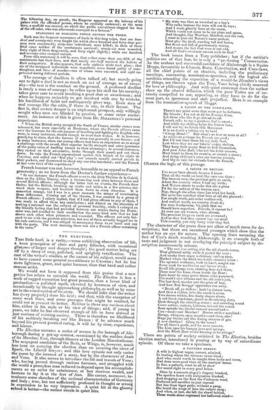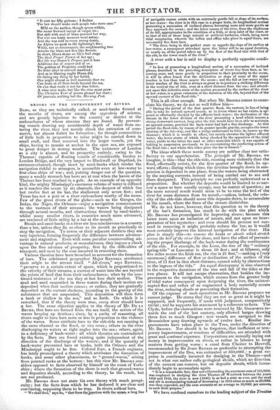TEE ELECTION. TEE ELECTION.
Tars little book is a rarity,—verse exhibiting observation of life, a keen perception of class and party fallacies, with occasional glimpses of larger and deeper thought ; the good matter being set off by a dress of easy, polished, and sprightly versification. The cast of the writer's studies, or the nature of his subject, would seem to have caused some general resemblance to CHABIIE ; but he has more lightness, grace, and quiet humour, than that bard and rather morose artist.
We would not have it supposed from this praise that a new genius has arisen to astonish the world. The Election is less a work of rugged execution but great promise, than a lower kind of production—a polished squib, elevated by keenness of view, and occasionally by thought approaching philosophy, as well as by some art in the construction of its story. We should infer that the writer has (very properly) done his best ; and that, with the exception of some weak lines, and some passages that might be omitted, he could not at present do better. Neither is there any raciness about him, either in his style or his view of things ; and, if young in years, we infer be has observed enough of life to have arrived at just notions of existing society. There is therefore no likelihood of his suddenly breaking out like BYRON : if he advance much beyond his present poetical rating, it will be by time, experience, and labour.
The Election narrates a series of scenes in the borough of Ale- borough during a got-up contest, occasioned by the sudden death of its Member, Cox, through dinners at the London Mansionhouse. The scapegoat candidate of the Reds, or Whigs, is, however, much less bent on carrying the election than on securing the niece of Spark, the Liberal lawyer; and this love episode not only varies the poem by the interest of a story, but by the characters of Ann and Vane. It also serves to introduce the life and travels of Vane; who, having passed through various fortunes, and struggled with the world a pennyless man reduced to depend upon his accomplish- ments as an artist for subsistence, at last receives wealth, and hastens to lay it at the feet of Ann. His career, moreover, in- troduces some sketches of the national characteristics of Germany and Italy ; true, but not sufficiently profound in thought or strong in expression to be very impressive. A quiet hit at the gloomy school is better—the author excels in quiet hits.
"My state was then as wretched as a boy's Who sulks because the stars will not be toys; And I made ghastly faces at the moon, Which would not come to be my plate and spoon, And thought, like Werther, Manfred, and the rest, I must in poor old Nature's name protest, Must play the devil, wanting tail and horns, But fierce and full of gentlemanly scorns, And mourn the fact that even is not odd, And all God's creatures cannot each be God."
The book issues from a Tory publisher ; but if the satirist's politics are of that hue, he is only a "professing "Conservative. As the zealous and successful candidate of Aleborough is a Squire Moggs, favourable to Church, State, Constitution, and Corn-laws, all the chief points of an election, including the preliminary meetings, canvassing, nomination-speeches, and the logical ab- surdities attending the exposition of a would-be Member's views of things, are thrown upon the Tory, Vane being chiefly reserved for love or philosophy. And with quiet contempt does the author show up the absurd fallacies, which the pure Tories are of ne- cessity compelled to use, appealing, as they have to do for the most part, to ignorance and stale prejudice. Here is an example from the nomination-speech of Moggs.
A SQUIRE ON THE CORN-LAWS.
There's one point more that must not be forborne, My friends : I'm not at all for Foreign Corn. Let those who like it go abroad to eat French roll; to me a quartern loaf is sweet ; And while my shilling helps the farmer here, I will not try to fatten thin Mounseer.
It is no doubt a taking cry to bawl "Cheap Bread!" But what's so dear as none at all ? • As milliners perhaps the French are ,,eood ; But I'll not trust them for my daily food, Lest when they see our bakers' empty shelves, They keep their musty flour to feed themselves, And poor John Bull, who left his fields unsown, Must kneel to them for crumbs, or munch a stone; And dying children's cries our bosoms wrench, And beg in vain for victuals from the French.
Observe the logic of this passage.
A SQUIRE ON BRITAIN.
I've never been abroad, because I know That all the world no land like ours can show : The bravest men, the prettiest girls on earth, Adorn the country where I had my birth; And Nature strove to make this isle a place Fit for the noblest of the human race.
Nay, though she often since has tried her hand,
She ne'er has matched what here of old she planned : For simple truth, and sober mother-wit, And modest worth, no country rivals it;
For were it otherwise, 'tis plain that we
Should have superiors. Friends, it cannot be At even our old women, when abroad, The proudest kings on earth are overawed ; And as they find they cannot buy nor steal This country, you may fancy what they feel.
The character of the poem does not allow of much room for de- scription; but there are occasional passages which show that the author has an eye for nature. The opening lines narrating the fact of Cox's death reaching Aleborough, is an example both of taste and judgment in not overlaying the principal subject by de- scription unnecessarily minute.
"The sun was setting o'er the old church-tower, That glittered softly while it pealed the hour ; And smoke from many a chimney curling slow, Marked where the black tea-kettle steamed below : The aproned workman, tools in hand, sought out Some nook for meditation and brown stout; Small idle groups were chatting here and there, These near the Lion, those beside the Bear ; Each heart by some grave theme alike possessed, The maid's new ribbons and the old man's jest, The last fresh murder and the price of hay, And how Ned Scroggs' apprentice ran away.
"Break off, ye triflers: hark ! a distant hum, And then a clatter, tells the coach is come.
Two dames within, five dusty shapes above, A red-faced coachman, grand as thundering Save, Dash through the admiring street ; and crowding round Come ostlers, waiters, loiterers, toward the sound.
Soon spreads the direful rumour unconfined- Cox—dead—our Member! Horror strikes mankind : Shrugs, whispers, open mouths—and then, alas! Huge joy breaks out like flaring streams of gas. A new election! Glory to the town!
For all there's profit, and for some renown.
The Lion opes his hungry jaws and springs, And the Black Bear seems dancing as he swings."
There are points of society satirized in The Election, besides election matter, introduced in passing or by way of subordinate episode. Of these we take a specimen.
A PATTERN PERSON.
A wife in highest vogue, correct, admired,
In lauding whom the virtuous never tired ; And who, could worth be caught from looks and tones, Had done more good than all the martyrs' hones. In fine, a pattern, wont in all to show Her moral right to every good below.
Once by a concert-singer's drapery brushed, The spotless heart with indignation blushed, And dropping on the floor the Cashmere woof, Preferred self-sacrifice to just reproof. But free from bigot pride, without a pang, She heard the songs of love the culprit sang;
And when, at last, she left the shawl behind,
These words alone expressed her hallowed mind-
"It cost me fifty guineas : I declare
The law should make such people take more care."
Mild on the surface, though severe within, She never frowned except at vulgar sin ; But still with soul of brass pursued her way, Nor e'er one hasty moment went astray. And she was cold to every wrong desire, As Alpine ice-peak to the lightning's fire; While, not so circumspect, the neighbouring tree Admits the blaze and dies like Semele.
In short, Diana ;hone on life's frail stage The ideal Proper Person of her age ; Her life was blazon'd Proper, and it bore Additions due of argent and of or. The goddess of Propriety could find No fitter sibyl to convert mankind; And as to blaming aught Diana did, Or daring any thing by her forbid, One might almost as well maintain that we Can learn at all from lands beyond the sea, Or e'en that truth is not for man below, A wine once made, but like the vine must grow.
The Christian Year of poems pleased her most ; Of journals, nothing but the Morning Post.



























 Previous page
Previous page